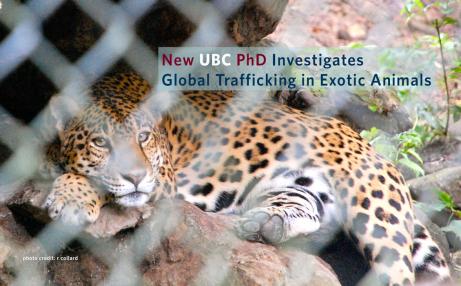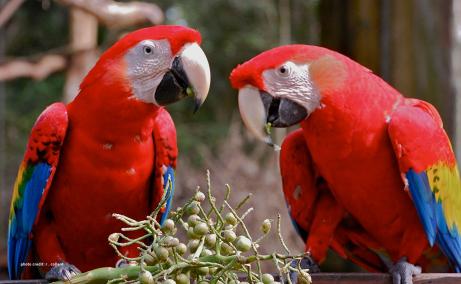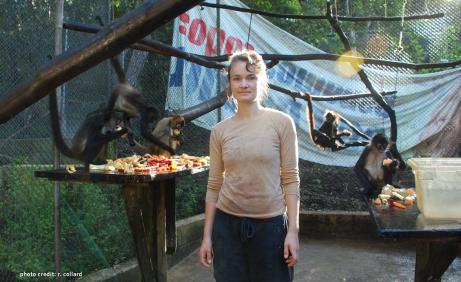We laugh at the antics of monkeys at the zoo. We admire the beautiful plumage of tropical birds in the local pet shop. But how many of us think about where those monkeys and birds came from?

Along with hundreds of other species, they, or their close ancestors may have been recently captured from their natural habitat and then transported and traded to locations on the far side of the planet, sometimes through channels of dubious legality. That’s no laughing matter.

Rosemary Collard chose to focus her doctoral research on trafficking in exotic pets, a study that is not for the faint-of-heart. It was her Master’s degree research into how cougars are hunted on Vancouver Island that solidified her commitment to animal welfare. Through that experience, she began to question the relationship between humans and animals.
Then she turned her attention to the exploitation of exotic animals by people who care more for the profits to be made than the well-being of those animals. It was the encouragement she received at UBC to focus on “the big, critical questions of our time” that inspired Rosemary to pursue her study. She was also pleased to get support from various agencies, such Environment Canada, who authorized her attendance at a Convention on International Trade in Endangered Species of Flora and Fauna.
While she enjoyed a lot of companionship and mentorship at UBC, Rosemary is frank about the stress and isolation she experienced conducting field research. Although she was in touch with her supervisor, friends and family through online networks, she often felt lonely as she tracked the trade in exotic animals through Mexico, Guatemala and Belize.
One of the most demanding places to engage in research was at the animal auction halls in the U.S. Although these auctions are legal, some of their animals were illegally imported but have acquired false papers that show they were captive-born and raised in the U.S. Once they have papers they can be legally bought and sold. Rosemary explains: “I had to really contain and try to hide my emotions because they would have betrayed my politics in situations where that would have been inappropriate.”
But perhaps the most difficult assignment was at a wildlife rehabilitation centre in a biosphere reserve in Northern Guatemala(ARCAS), where Rosemary handled monkeys being habituated into the wild after being rescued from illegal shipments. In an attempt to reverse the effects of their capture, she was required to make the monkeys hate and fear humans, which she did with activities such as spraying water at them. Disagreeable as the task was, Rosemary’s commitment to the long-term survival of the animals made her continue.
 Rosemary Collard with spider monkeys, ARCAS wildlife rehabilitation centre, Northern Guatemala
Rosemary Collard with spider monkeys, ARCAS wildlife rehabilitation centre, Northern Guatemala
In her dissertation abstract, Rosemary states: “Against mass species loss and escalating concern over declining biodiversity, legal and illegal trade in wildlife is booming. Annually, it generates tens of billions of dollars and involves the circulation of billions of live and dead animals worldwide.” Her efforts to investigate this situation are to be admired, especially since she now realizes that she found it very stressful to conduct so much prolonged research around suffering and dying animals. She confesses: “It really took an emotional toll that I didn’t completely register or acknowledge at the time.”
In spite of the many arduous aspects of her research, Rosemary has nothing but positive comments about having taken her doctoral journey. “Being a PhD student was great because you could be self-directed, but as a “self” who is fundamentally shaped and supported by many others. If I had known before starting my PhD what I know now, I would be even more likely to do one!”
Rosemary will be awarded her PhD at next week’s congregation ceremony. Live streaming of the ceremony is available on line.
To read Rosemary’s dissertation, visit UBC’s cIRcle website.
For more on UBC’s Department of Geography graduate programs.